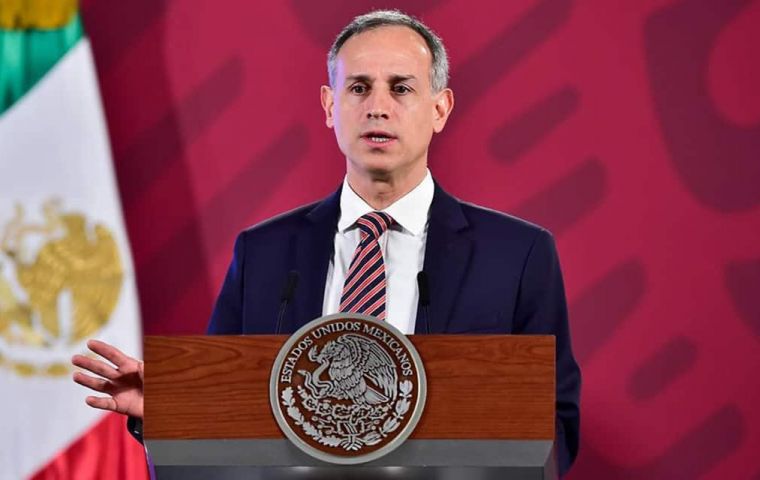MercoPress. South Atlantic News Agency
Many Mexicans showed persistent sequelae from COVID-19
 López-Gatel estimated active cases of COVID-19 had gone down
López-Gatel estimated active cases of COVID-19 had gone down A survey from Mexico's Health Ministry released this week has shown that over one-third of patients who have been infected with SARS-CoV-2 still have recurrent problems known as “persistent sequelae” despite having overcome the disease.
The study also indicated that 62.5% of those infected suffered a subsequent impact, albeit only temporary. The most frequent effect is is “fatigue,” followed by muscle or joint pain, cough, headaches, loss or decrease of smell, difficulty in breathing, fever, and loss or decrease in taste.
The National Health and Nutrition Survey 2021 (Ensanut 2021) found that other subsequent impacts were “difficulty sleeping, weight loss, shortness of breath, anxiety, and chest pain.”
The study, conducted between August and November 2021 in 12,619 households, also revealed that 75% of Mexicans had antibodies following either infection or vaccination and that 57.9% of residents had been infected to some extent.
The research also found that 70% of the people infected with COVID-19 were treated in private clinics, as the national health system was strained past its capabilities amid a pandemic scenario. At least 32.1% of the patients went to clinics with private doctors in neighborhoods and 11.7% to clinics adjacent to pharmacies, where doctors tend to be less qualified and their prescriptions are often linked to the consumption of drugs, the report said.
Arantxa Colero, a specialist at the INSP's Health Systems Research Center, told ANSA that “people have the feeling that the cost of consultations in pharmacies is low” because they do not consider the outlay for drugs, which “is high”. Another 10% were attended in private hospital offices, 6.7% received private care in their homes and 2.7% remotely, the study showed. Colero also argued most Mexicans preferred private clinics out of fear of contagion in state-run hospitals.
“There is no evidence that the quality of care in the private sector is better than in the public sector,” Colero said.
With more than 327,000 deaths and 6.7 million infections, Mexico was the country with the fifth highest mortality rate in the world due to the pandemic, after the United States, Brazil, India, and Russia.
A fifth wave of COVID-19 apparently reached its peak July 13, but the number of cases has been slowing down since, according to Vice Minister of Health Hugo López-Gatel, who estimated active cases had gone down. Mexican authorities still recommend preventive measures together with the use of facemasks and keeping social distance.
(Source: ANSA)




Top Comments
Disclaimer & comment rulesCommenting for this story is now closed.
If you have a Facebook account, become a fan and comment on our Facebook Page!